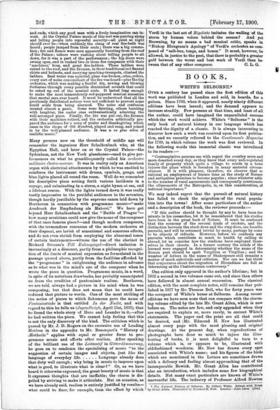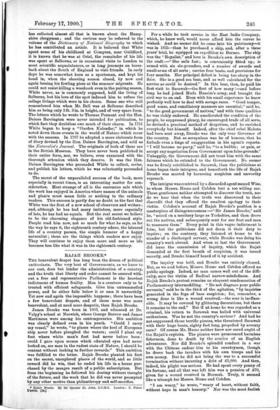BOOKS.
WHITE'S SELBORNE.*
OvER a century has passed since the first edition of this work was published in London and sold, in boards, for a guinea. Since 1789, when it appeared, nearly ninety different
editions have been issued ; and the demand appears to increase steadily. Few persons at that time, and least of all
the author, could have imagined the unparalleled success which the work would achieve. White's " Selborne " is the only book of natural history in our language which has reached the dignity of a classic. It is always interesting to discover how such a work was received upon its first publica- tion, and we recently referred to the Gentleman's Magazine for 1789, in which volume the work was first reviewed. In the following words this immortal classic was introduced to its readers :— " Contemplative persons see with regret the country more and more deserted every day, as they know that every well-regulated family of property which quits a village to reside in a town injures the place which is forsaken in many material circum- stances. It is with pleasure, therefore, we observe that so rational an employment of leisure time as the study of Nature and antiquities promises to become popular ; since whatever adds to the number of rural amusements and consequently counteracts the allurements of the Metropolis, is, on this consideration, of national importance."
We may indeed regret that the pursuit of natural history has failed to check the migration tof the rural popula- tion into the towns ! After some particulars of the author and a description of the book, the reviewer proceeds :—
" If this author should be thought by any to have been too minute in his researches, let it be remembered that his studies have been in the great book of Nature. It must be confessed that the economy of the several kinds of crickets, and the distinction between the stock-dove and the ring-dove, are humble pursuits, and will be esteemed trivial by many, perhaps by some to be objects of ridicule. However, before we condemn any pursuits which contribute so much to health by calling us abroad, let us consider how the studious have employed them- selves in their closets. In a former century the minds of the learned were engaged in determining whether the name of the Homan poet should be spelt Vergilius or Virgilius ; and the number of letters in the name of Shakespeare still remains a matter of much solicitude and criticism. Nor can we but think that conjectures about the migration of Hirundines are full as interesting as the Chattertonian controversy."
One edition only appeared in the author's lifetime; but in 1802 a second in two volumes came out, and since then others have followed in almost annual succession. The classical edition, with the most complete notes, still remains that pub- lished in 1877 by Mr. Thomas Bell, who for forty years was the occupant of White's house at Selborne. Among recent editions we have seen none that can compare with the charm- ing volume edited by the late Mr. Grant Allen, which is now before us. The notes are few, and only appended when they are required to explain or, more rarely, to correct White's statements. The paper and the print are all that could be desired, and ;Mr. Edmund H. New has illustrated almost every page with the most pleasing and original drawings. At the present day, when reproductions of photographs have done so much to injure the illus- trating of books, it ,is most delightful to turn to a volume which is, or appears to be, illustrated with
old-fashioned woodcuts. Mr. New has drawn every spot associated with White's name; and his figures of the birds
which are mentioned in the Letters are sometimes drawn with a delicacy and feeling almost approaching that of the incomparable Bewick. Mr. Grant Allen has contributed also an introduction, which includes some few biographical details. Not many exact particulars are known of White's uneventful life. The industry of Professor Alfred Newton
The Natural History of Selborne. By Gilbert White. Edited, with Notes by Grant Allen. Illustrated by Edmund H. New. London : John Lane. [21s.J has collected almost all that is known about the Hamp- shire clergyman ; and the curious may be referred to the volume of the Dictionary of National Biography to which he has contributed an article. It is believed that White spent some of his childhood at Compton, near Guildford, it is known that he was at Oriel, the remainder of his life was spent at Selborne, or in occasional visits to London to meet scientific acquaintances, or in long journeys on horse- back about the South of England to visit friends. In early days he was somewhat keen as a sportsman, and kept his hand in, when the shooting season closed, by now and again loosing his fowling piece at the summer migrants. He could not resist killing a woodcock even in the pairing season. White never, as is commonly supposed, held the living of Selborne, but his love of the spot induced him to refuse the college livings which were in his choice. Some one who still remembered him when Mr. Bell was at Selborne described him as being only 5 ft. 3 in. in height, and of very spare form. The lettere which he wrote to Thomas Pennant and the Hon. Daines Barrington were never intended for publication, to which fact they doubtless owe much of their charm. In 1751 White began to keep a "Garden Kalendar," in which he noted down those events in the world of Nature which recur with the seasons. In 1767 he adopted a more elaborate form of diary devised by the Hon. Dairies Barrington, and sold as the Naturalist's Journal. The originals of both of these are in the British Museum. They have never been published in their entire form, nor, we believe, even examined with the thorough attention which they deserve. It was the Hon. Daines Barrington who persuaded White to collect, revise, and publish his letters, which he was reluctantly persuaded to do.
The secret of the unparalleled success of the book, more especially in recent times, is an interesting matter for con- sideration. Most strange of all is the enormous sale which the work has enjoyed in America where names of the animals and plants must mean little or nothing to the ordinary readers. This success is partly due no doubt to the fact that White was the first of a new school of observers and writers ; and, although he has had many imitators, more especially of late, he has had no equals. But the real secret we believe to be the charming elegance of his old-fashioned style. People read him now, not so much for what he says, as for the way he says it, the eighteenth century odour, the leisured life of a country parson, the simple humour of a happy naturalist ; these are the things which readers now enjoy. They will continue to enjoy them more and more as life becomes less like what it was in the eighteenth century.







































 Previous page
Previous page